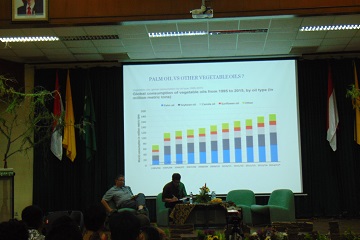Awareness Towards Peat lands, Soil Resources Student Community IPB Hold a National Seminar

The Soil Resources Student Community (HMIT) Bogor Agricultural University (IPB) held a National Seminar “Sustainable Peat land Management”, which was held at Toyib Hadiwidjaja Auditorium, IPB Dramaga Campus, Bogor (10/14). The Dean of the Faculty of Agriculture IPB, Dr. Ir. Suwardi, M.Agr, in his opening speech explained that agriculture and the environment are two closely linked factors but often contradict one another.
“This is due to the agricultural development which is often associated with environmental destruction. Related towards this issue, is the development of peat lands which is very often related to these environmental issues. Therefore, this seminar will be explained by the speaker about ways to develop peat lands in the agricultural sector but also keep conserving the environment,” said Dr. Ir. Suwardi.
In the year 1970-1980 peat lands were used to develop transmigration in Indonesia. During this era the peat lands which were often utilized were shallow and were used to plant paddy. However, many failures occurred due to the minerals in the shallow peat which easily vanished and could not sustain. Later on, with the continuous development of technology, in the year 1990 peat lands were benefited for the development of Industrial Plant Forestry (HTI) and palm oil farms.
“In the past, peat lands were often taken for granted in the development of HTI and palm oil farms due to the difficulties in the development and having not found the right technology. Now with the right technology in the industrial revolution era 4.0, the development is much easier due to the adequate technology. In this era we can also see the development of the worlds agriculture. If we do not quickly develop these marginal lands in Indonesia, it cannot be denied that we will in the future import foodstuffs from other countries. Through technology, we will be able to save costs and create efficient production and our agricultural products will be able to compete in the global market. Era 4.0 is not the era of competition, but it is the era where there should be cooperation between the agriculture and forestry,” Dr. Ir. Suwardi explained.
Discussions on peat lands during the seminar were divided into three main topics. The first discussion was presented by Dr. Ir. Basuki Sumawinata, M.Agr, a lecturer in the Division of Physical Land Resources Development Department of Land Resources and Land Management (ITSL) IPB, under the topic “Understanding the Characteristics of Peat lands in Order to Support the Management of Peat lands”. The second topic was taken from the industrial point of view which was brought by Dian Novarina, M.Sc as APRIL’s Deputy Director of Stakeholder Engagement, with the topic “Best Practice, Sustainable Forest and Peat land Management in Indonesia.” The third topic was brought by Dr. Bandung Sahari, SP., M.Si as the Senior Vice President of PT. Astra Agro Lestari, Tbk, with the topic “Responsible Peat land Management for Sustainable Palm Oil.”
For the closing of the talkshow, Ir. Heru Paulunggono, MAgr.Sc, as the lecturer from the Division of Chemistry and Fertility of Soil Department ITSL IPB as the moderator gave a conclusion on a few things that should be considered during the management of peat lands.
First, it is important to understand the characteristics of peatlands so that we can understand the next steps in process of management. Second, the utilization of peatlands must be done with feasibility studies. Not only the characteristics of the land, but also the social and economical aspects. Third, all candidates or soil experts must invision whether or not policies on peatland cultivation corresponds with the scientific aspects. If the policies do not yet correspond, give suggestions with concrete proof to the stakeholders.
“Sustainable peat land management is not impossible to achieve, therefore it is our duty to do so,” said Ir. Heru Pulunggono. (AVR)


